|
|
|
|||||||||||||||||||||||||||||
|
|
|
|
|
|||||||||||||||||||||||||||
|
|
|
|
|
|
|
|
||||||||||||||||||||||||
|
|
|
|
|
|||||||||||||||||||||||||||
|
|
|
|
||||||||||||||||||||||||||||
|
|
|
|||||||||||||||||||||||||||||
|
|
|
|
|
|
 |
|
||||||||||||||||||||||||
|
|
|
|
|
|||||||||||||||||||||||||||
|
|
|
|
|
|||||||||||||||||||||||||||
|
|
|
|||||||||||||||||||||||||||||
|
|
|
|||||||||||||||||||||||||||||
|
|
|
|
|
|||||||||||||||||||||||||||
|
|
 |
|
|
|||||||||||||||||||||||||||
|
|
|
|
|
|||||||||||||||||||||||||||
|
|
|
|||||||||||||||||||||||||||||
|
|
|
|||||||||||||||||||||||||||||
|
|
|
|||||||||||||||||||||||||||||
|
|
|
|
||||||||||||||||||||||||||||
|
|
|
|||||||||||||||||||||||||||||
|
|
|
|
|
|||||||||||||||||||||||||||
|
|
|
|
|
|||||||||||||||||||||||||||
|
|
|
|
|
|||||||||||||||||||||||||||
|
|
|
|||||||||||||||||||||||||||||
|
|
|
|||||||||||||||||||||||||||||
|
|
|
|||||||||||||||||||||||||||||
|
|
|
|||||||||||||||||||||||||||||
|
|
|
|||||||||||||||||||||||||||||
|
|
|
|
|
|
|
|
|
|
|
|
|
|
|
|
|
|
|
|
|
|
|
|
|
|
|
|
|
|
|
|
In troubled Lebanon, a safety zone for sea turtlesBy Nadim Audi - International Herald Tribune
Published: October 23, 2006
TYRE, Lebanon For millions of years, Mediterranean sea turtles have been coming to this shore in what is now southern Lebanon to lay their eggs. Every summer since the time of the dinosaurs, their babies have hatched and literally run for their lives on the strip of sand that separates their nests from the sea. An endangered species, they had been largely ignored in this war-torn stretch of Lebanon until six years ago, when two women set out to protect their fragile nesting dance. The inspiration was a walk on the beach by Mona Khalil when she was visiting her homeland. She had flown in from the Netherlands, where she worked as a porcelain restorer. Her family's house, abandoned during the Lebanese civil war in the 1980s, sat between Tyre and Naqoura, dangerously close to the buffer zone that the Israeli Army occupied at the time. Still, she risked a walk along the sand, and came upon the turtles. "The first time I saw them, it was completely by accident," Khalil said. "I suddenly heard a noise. It was a turtle creeping through the sand, coming to lay her eggs." That beach was one of only three remaining nesting sites in southern Lebanon. Upon learning that the turtles were close to disappearing from her country, Khalil decided to "come back and do something about them." The next year, 2000, she returned and teamed up with Habiba Fayed, who shares her passion for the environment. They opened a bed-and-breakfast in the Khalil home to finance their efforts, calling it the Orange House in honor of the Netherlands. Guests could simply vacation or, in the spirit of ecotourism, they could help the owners protect the turtles' nests and keep the beach clean. That was key. According to Medasset, a local marine wildlife group, if a turtle finds a garbage-strewn shore when she comes to lay her eggs, she will drop the eggs in the water, condemning her offspring to certain death. Two species of large sea turtles nest in the Mediterranean, the loggerhead (Caretta caretta) and the green turtle (Chelonia mydas), which has been declared critically endangered by the World Conservation Union. They can live for more than 100 years, taking 50 years and 30 years, respectively, to reach adulthood and start producing eggs. Female turtles travel to the exact spot where they were born decades earlier to dig their nests in the sand, laying an average of 70 to 100 eggs. The reptiles, about a meter, or three feet, wide, seem to be "in a trance when they lay their eggs," Khalil said. They then go back to the sea. They will have no further part in the lives of their offspring. This is the moment when the women intervene. They protect the nests from predators like foxes, wild dogs and crabs by burying an iron grid in the sand above the eggs. This prevents animals from attacking during the month it takes for the eggs to hatch. The spaces on the grid are large enough to allow the baby turtles to emerge and find their way to the sea. "We become their surrogate mothers," Fayed said. A major reason Mediterranean sea turtles can still be found in southern Lebanon is the Israeli occupation, which kept the area untouched from 1982 and 2000. Construction has destroyed most of their habitat in the rest of the country. The recent fighting between Israel and Hezbollah did not affect the turtles, even when shooting in the area around the Orange House grew so intense that Khalil, 57, and Fayed, 48, had to flee. "Hezbollah was shooting rockets from very close," Khalil said. "We were in danger and escaped to Beirut for two weeks." When they returned, they found that their house had been hit by an Israeli shell. But only one nest had been destroyed by predators. And 30 new nests had appeared, the women said, making 2006 the best season since the project started. Nonetheless, the protection of the nests is far from assured in this troubled land, where animals must coexist with armies, dynamite fishing and pollution. To protect the turtles, Khalil and Fayed have become the de facto police of their shore. The pollution of beaches in Lebanon has various sources, from hospital waste to factory chemicals and plastic bags. Its impact on the turtles is direct: shorter life expectancy and high cancer rates. Much of the garbage that lands on the shore near the Orange House seemed to come from the headquarters of Unifil, the United Nations peacekeeping force in Lebanon, a few kilometers to the north. "They are not environmentally conscious," Khalil complained. "We've had Italian, Spanish and French garbage washed up on the shore everyday." Khalil met during the summer with a UN officer who promised to try to curb the pollution. While swimmers and fishermen still find the occasional Italian water bottle or French mustard jar, the amount of garbage dumped has been reduced, she said. In a country where animals and the environment are far from top priorities, the Orange House is a unique place. It was built in the 1970s by Khalil's grandfather, who intended it as a house where the family's children could come and play. While the civil war prevented this, the "summer vacation" spirit remains. Though word of a guest house on a beautiful beach with nesting turtles has spread in Lebanon, most visitors to the Orange House are foreigners. "Our guests are mainly Europeans who work in Beirut - French, Germans," Khalil said. "The few Lebanese are often married to Westerners. The rest ignore us." Khalil and Fayed would like to see this change, hoping that environmentally conscious Lebanese youth will maintain their legacy by protecting the turtles. But how likely is that? Khalil smiled. "I'm optimistic." |
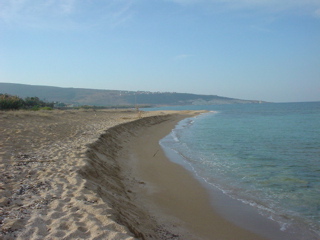 Nesting Site |
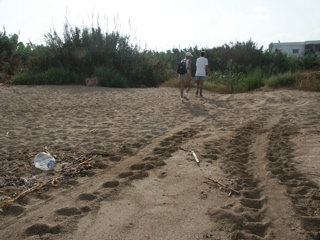 Sea Turtle Tracks |
 Green Turtle Nest |
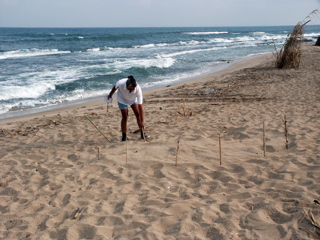 Attempt at locating the eggs |
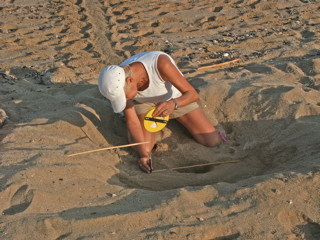 Taking measurements of the egg chamber |
 Egg chamber |
 Protecting the nest with wire-mesh |
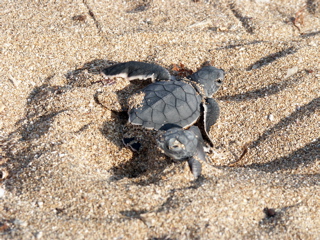 Green Sea Turtle hatchlings emergingfrom the nest |
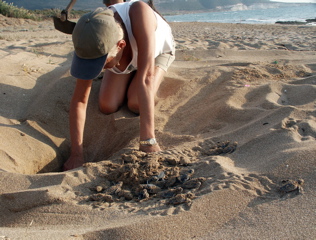 Mona releasing the rest of the hatchlings |
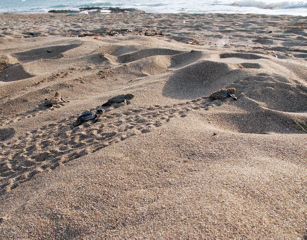 Hatchlings on their journey to the sea |